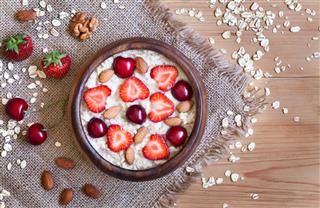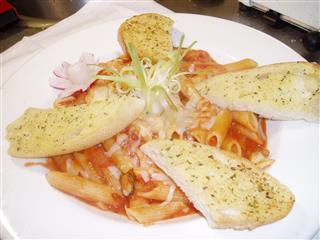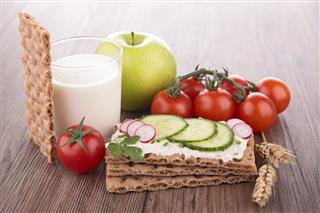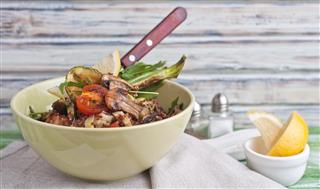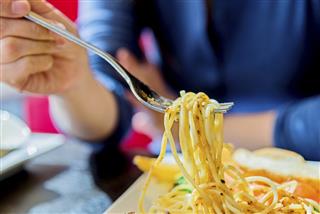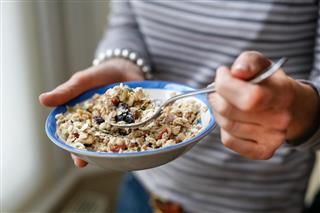
Students do not always make the correct choice when it comes to having their meals at college dining halls. Let us look at what you should, or should not eat to remain fit and healthy once you are at college, away from home.
Starting college opens up a new chapter in a teenager’s life. With a whole range of new things to adjust to, from signing up for new classes to finding the ideal roommate, it can seem a bit overwhelming. What you eat in the college dining hall is of utmost importance. The right choice of food will give you the energy you need to pull through the day and to sustain you during those extra hours of study. Parents must often be wondering what their children are eating once they are at college. With no one to monitor mealtime, no access to home-cooked meals, and a packed schedule, students are bound to resort to munching on prepackaged food. It’s very easy to form unhealthy food habits. Parents must counsel their children on the risks of unhealthy eating habits before they leave home for college. Food served in college dining halls can be a source of concern for most parents.
Eating Healthy in the College Dining Hall
Breakfast is the most important meal of the day. Do not skip it. It gives you the energy to kick-start your metabolism. A dish piled with hash browns, bacon, and pancakes and a glass of smoothie can seem very tempting, but try to avoid it. Instead opt for egg whites, a bowl of oatmeal liberally sprinkled with fresh fruit pieces, and a glass of milk. This will give you all the carbohydrates and proteins you need as part of the first meal of the day. This does not mean never having your favorite pancakes drizzled with maple syrup on top. But do not get into the habit of eating it every day.
Cut down on too much cheese and avoid generous use of creamy salad dressings high in fat content. If you prefer a grab-and-go meal, opt for whole grain sandwiches filled with vegetables and grilled chicken breast, instead of a bacon and mayo sandwich. If the dining hall has a salad bar, visit it often! Eat loads of veggies. If you are averse to the taste of raw vegetables, use seasonings and low-fat dressings like vinaigrette. You may not always get time to enjoy a lazy lunch if you have classes lined up in the afternoon; so be all the more careful what you eat. Picking up a plate of fries and chicken nuggets can be so alluring, and it’s alright if you eat it every once in a while, but do not over-indulge. If you love mac-n-cheese, eat a healthy portion of steamed or stir-fried vegetables along with it.
Dinner time? Opt for brown rice or pasta instead of white rice or white bread. Check if the dining hall serves grilled, baked or steamed meat dishes instead of deep-fried. Whole grain pita bread filled with humus, raw veggies, and low-fat salad dressing is a good option. Avoid late dinners. Munching on pizzas at midnight is common amongst college kids, but that’s a very wrong time to gorge on food. Have dinner at a reasonable hour. Eat desserts in moderation. Do not have ice cream and cake every night. Have smaller portions instead. Have yogurt and fruit as a change from the routine.
Pick up a couple of fruits to snack on in between meals. Having a bar of candy is perfectly alright, but substitute it with a granola bar every now and then. Munch on dried fruits like plums, prunes, cranberries, and apricots. Eat almonds, walnuts, and raisins. Soda and beer should be a strict no-no. These are drinks with zero nutrition and excess calories. Gulp them down with your meals and you will soon realize you have piled on extra pounds in no time, inching your way towards the dreaded Freshman 15. Avoid sports drinks. Stick to water and fresh fruit juice. Drink enough water during the day. Refrain yourself from going to the vending machine for a soda and a bag of peanuts. Eating an apple and having a glass of water instead is so much more healthier! Do not spend a lot of time in the dining hall. If you linger on, you are susceptible to continue eating even after your stomach is full.
Most colleges nowadays offer detailed information about the food being offered in the dining hall. Check out the nutritional information, look up on the college website or talk to the diet and nutrition staff on what all food services are offered so you can make the right, healthy choices. Most dining services also have special meal plans for students if they happen to be vegan or vegetarian, have special dietary requirements or are allergic to certain foods.
To sum it up, your body needs a balanced diet which includes a mix of carbohydrates, proteins, fiber, vitamins, and minerals. A diet rich in all these is vital for the body and brain to function optimally. So the next time you reach for fries and a can of soda, think of what combination of food items is ideal for your body and choose accordingly.





